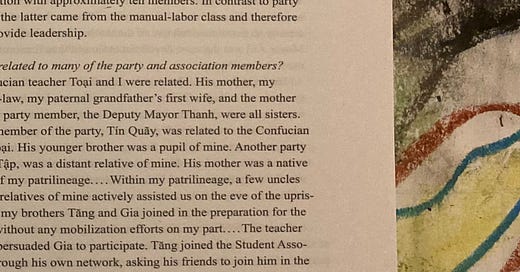Tradition, Revolution, and Market Economy in a North Vietnamese Village, 1925-2006 (iv)
from anthropologist Hy Van Luong and Vietnamese studies
"Were you related to many of the party and association leaders?"
"The Confucian teacher Toại and I were related. His mother, my mother-in-law, my paternal grandfather’s first wife, and the mother of another party member, the Deputy Mayor Thanh, were all sisters. A fourth member of the party, Tín Quãy, was related to the Confucian teacher Toại, His younger brother was a pupil of mine. Another party member, Tấp, was a distant relative of mine. His mother was a native member of my patrilineage . . ."
So, yeah, Nguyễn Dắc Bằng was related to many of the party and association leaders. Bằng is the friend whom author Hy V. Luong met in Canada that brought him to Sơn-Dương village as yet another relative to study his family in tradition, revolution, and the market economy.
Bằng introduced Hy to his village as a fictive relative. Bear in mind that in Sơn-Dương a father often has adopted a stranger as a son to inherit, when he had living daughters. Their role is to marry out and join other lineages.
I suspect that as here in North Carolina any two members of distinct lineages long resident this side of the Atlantic can establish a family relation in 20 minutes’ conversation. Such families populated our constitutional convention.
They haven’t gone anywhere. They know who they are, as do those in Sơn-Dương. Hy explains that the period of this second chapter begins in 1925 with the exile of Phan Bội Châu and the death of Phan Chu Trinh, anti-colonialists of this ilk,
and ends in 1930 with the complete destruction of their nationalist party in its uprising at Yên-Báy in 1930. But he does not stress that they lost. Their rivals and successors the communists did. They pointed out that the nationalists not only were all related,
by definition not a mass party, but even among their families all leadership came from the less than 1 per cent who had achieved even primary schooling. Well sure. That didn’t work out. Live and learn. But when Hy arrived well after all the shooting was over he found the same families who had schemed since 1925.
The enduring issue the anthropologist discerns in Sơn-Dương is not communism and nationalism as parties or thought but collectivism and hierarchy within and among the families. Anti-colonialism was all very well, and world communism, then globalized capital,
why not. But how shall we feed everyone? And who gets to sit at the head of the banquet?
This was the fourth Viet Nam letter of 5 so far on Tradition, Revolution, and Market Economy in a North Vietnamese Village, 1925-2006 by Hy Van Luong. The first had posted on April 6, 2022, the second on May 7, 2022, and the third on June 8, 2022.
The fifth went out on January 29, 2023.
Viet Nam letters respects the property of others under paragraph 107 of United States Code Title 17. If we asked for permission it wouldn’t be criticism. We explain our fair use at length in the letter of September 12, 2022.
The colophon, directly above, of these Viet Nam letters shows the janitor speaking with poet David A. Willson on a Veterans Day.







